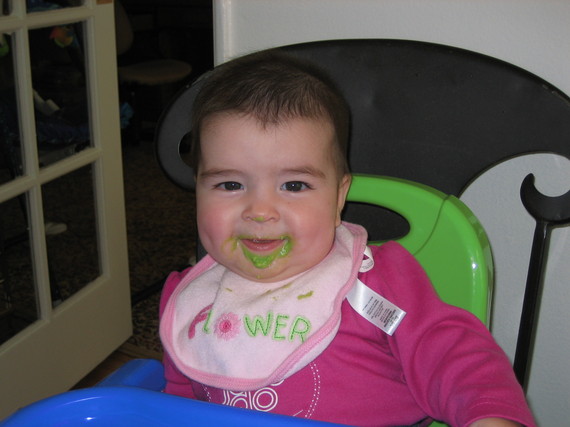When I was pregnant with my first child I thought about the type of eater she would be. Would she be a picky eater or a good eater? As a dietitian, I really didn't like the idea of having a picky kid.
To my delight, my girl ate everything. After her second birthday, I noticed her starting to pick at meals and reject previously liked items, like broccoli. My previous research on infant feeding made a quick turn to toddler feeding. After reading a few of Ellyn Satter's books and researching the subject, I realized that I shouldn't make a big deal about this. It was my job to provide the food and hers to eat it (see Satter's Division of Responsibility). Not only that, due to slowed growth and other developmental changes, this pickiness was to be expected. Who knew?
Then baby number two arrived and the same thing happened. My son didn't eat everything like my daughter, but he had a huge appetite and ate a wide variety of food. I vividly remember the meals at this time. I had one kid asking to leave after two bites and another shoveling food in his mouth, yelling "more."
I couldn't shake the feeling that my daughter's picky eating was the result of something I did. Was I a good enough cook? Was I making the food "fun" enough? Was "I" enough?
At the peak of my internal struggle, I received an email from a mom with a girl that sounded just like my daughter. This mom chose another path and fought her daughter's selective choices and the resulting food battles were not pretty. Yet here I was with a picky child who enjoyed eating without the pressure and food battles. From that moment on I stopped looking at picky eating as a "problem" or something that was my fault. And you know what? It made mealtime infinitely better. It not only positively affected food interactions with my children, when my son went through it, I didn't even bat an eye. And now, years later, my daughter has gradually added many more foods to her repertoire.
I know I'm not alone in my experience. When I teach a room-full of parents of toddlers, almost every story is the same -- "as a baby my child ate everything and now he barely eats and rejects food." Yes, there are some exceptions, but surveys reveal that nearly half of parents of young children report some type of fussy eating. Yet most of the parents I meet complain about picky eating like it is unique to them.
The problem isn't picky eating like parents believe, but the way in which it is perceived. A classic psychological study tells us why perception matters. Teachers were told 20 percent of the randomly chosen students were expected to do very well by the end of the school year, regardless of their test scores. Eight months later these kids tested better than the rest. Why? Because the teachers treated the kids differently based on their perception of the child's ability.
This is exactly what happens with picky eating. When parents see their child become picky with food, their negative impression colors how they treat their child. There is so much negativity and judgment surrounding this topic, it's easy for self blame and stressful meals to set in. No one wants to be the parent of a picky eater, yet so many of us are. We do all we can to get rid of it, but that only makes it stay around longer.
What parents are not being told is children learn to eat the same way they learn lots of things -- and some are faster and some are slower learners and others in between. What if we expected children to read the same books we read when they first start sounding out words? What if, when they couldn't read our books, we told them, "you're so illiterate." We don't. Instead, we encourage and give them time and practice. Yet with picky eating, kids get labeled, pressured to eat or are given up on at the earliest of ages.
It's time to look at picky eating through a completely different lens. Picky eating is not bad, but simply part of the process of food learning. Let's give children the support they need to learn to like a variety of foods. And please, let's stop judging each other -- and ourselves-- for something that is normal and to be expected.
